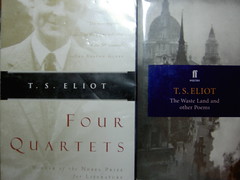Saturday, January 07, 2006
Some thoughts on Eliot
At tuition class this morning, I worked through the following poem by Richard Wilbur with my 15-year-old student:
Parable
I read how Quixote in his random ride
Came to a crossing once, and lest he lose
The purity of chance, would not decide
Whither to fare, but wished his horse to choose.
For glory lay wherever he might turn.
His head was light with pride, his horse's shoes
Were heavy, and he headed for the barn.
The phrases are staggered and begin and end in mid-line, but this was new to her. So I cited some examples from Eliot's 'Little Gidding' to illustrate how and why this technique works:
Every phrase and every sentence is an end and a beginning,
Every poem an epitaph. And any action
Is a step to the block, to the fire, down the sea's throat
Or to an illegible stone: and that is where we start...
...The moment of the rose and the moment of the yew-tree
Are of equal duration. A people without history
Is not redeemed from time, for history is a pattern
Of timeless moments...
In the first part of the excerpt, the terraced effect serves to emphasise death and endings, while the nature and enigma of time is the subject of the second.
It also dawned upon me that in the fifth and final stave of 'Little Gidding' (also the very last stave of Eliot's Four Quartets), profundity and clarity are one in the lines;
We shall not cease from exploration
And the end of all our exploring
Will be to arrive where we started
And know the place for the first time.
It is said that Four Quartets 'expands the spiritual vision brought out in The Waste Land.' I think I'll spend the next few days looking into it.
Subscribe to:
Post Comments (Atom)

No comments:
Post a Comment